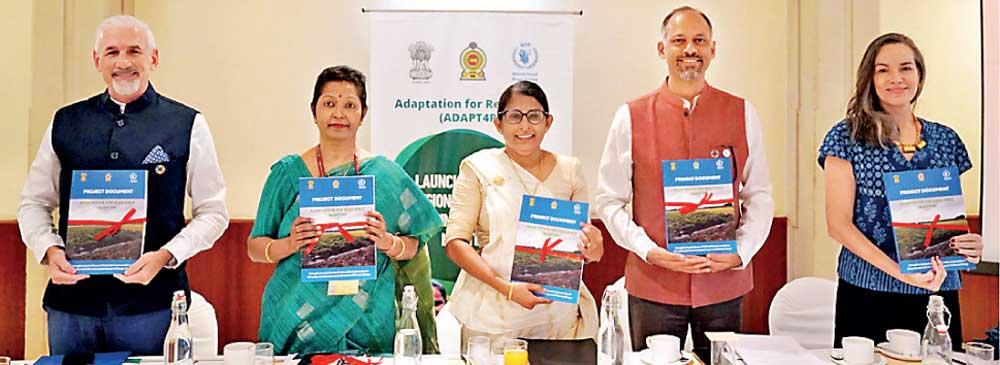Reply To:
Name - Reply Comment

Photo: (from left): Shombi Sharp, UN Resident Coordinator for India; Rajasree Ray, Economic Advisor, MoEFCC, Government of India; W.G. Kumaragama, Additional Secretary (Environment Projects & Education Training) to the Ministry of Environment in Sri Lanka; Mr. Gerard Rebello, Deputy Country Director, WFP Sri Lanka; and Elisabeth Faure, Country Director, WFP India
The United Nations World Food Programme (WFP), together with the Ministries of Environment of India and Sri Lanka launched its Adaptation for Resilience (ADAPT4R) project on October 22.
The five-year initiative aims to enhance the food security and livelihoods of farming communities facing climate-induced challenges.
Supported through a US$ 14 million contribution from the Adaptation Fund, the project is focused on those districts in the two countries where farmers face adverse weather impacts on agriculture and rural livelihoods. By providing information through climate services and leveraging existing systems, ADAPT4R will empower farmers, especially women, to make their farming and livelihoods resilient to the impacts of climate change.
The Ministry of Environment, Forest and Climate Change (MoEFCC) of the Government of India and the Ministry of Environment, Wildlife, Forest Resources, Water Supply, Plantation and Community Infrastructure of the Government of Sri Lanka will jointly implement this with WFP.
Climate risks
“India is at the forefront of responding to the increasing climate risks to food security. According to the Global Climate Risk Index (2021), the country is among the top 10 most vulnerable to climate events. This new partnership between WFP and MoEFCC would help address some of the critical climate-related challenges in India by building the adaptive capacity of smallholders in dryland areas,” said Rajasree Ray, Economic Advisor, MoEFCC, Government of India.
“The Adaptation for Resilience project marks a milestone in Sri Lanka’s collaborative efforts with WFP to tackle the universal challenge of climate change,” says W.G. Kumaragama, Additional Secretary (Environment Projects and Education Training) to the Ministry of Environment in Sri Lanka. “This timely project enables India and Sri Lanka to collaborate and learn from each other, as we work towards a common goal of helping at-risk communities build climate resilience.”
The launch was also accompanied by a regional inception event, which provided a platform for stakeholders from India and Sri Lanka to move forward in project implementation. The event brought together government officials and experts from both countries to discuss the way forward.
Adaptive capacity
“This initiative will enhance the adaptive capacity of economically disadvantaged farming households confronted with significant climate risks, enabling them to implement localised adaptation strategies through improved practices and diversified, climate-resilient livelihoods and employing a participatory approach,” said Elisabeth Faure, Country Director, WFP in India.
“Our food systems are at the mercy of the rapidly intensifying effects of climate change,” says Gerard Rebello, WFP Sri Lanka Deputy Country Director. “By partnering with the Ministry of Environment, we aim to boost resilience and help vulnerable communities better prepare for erratic weather patterns. This will not only safeguard lives and livelihoods but ensure that the journey of food is uninterrupted.”
Additionally, present at the launch were Shombi Sharp, the United Nations Resident Coordinator in India; Ruchika Drall, Deputy Secretary of the Ministry of Environment, Forest and Climate Change; M.H.A.M. Riflan, Director General of the Partnership Secretariat for WFP Cooperation; and Nozomi Hashimoto, Deputy Country Director of the World Food Programme in India.